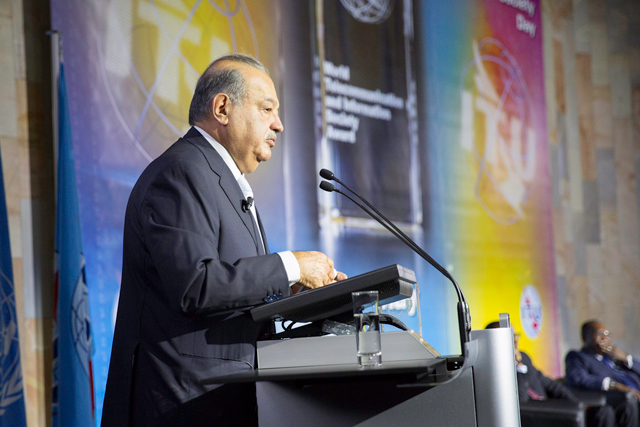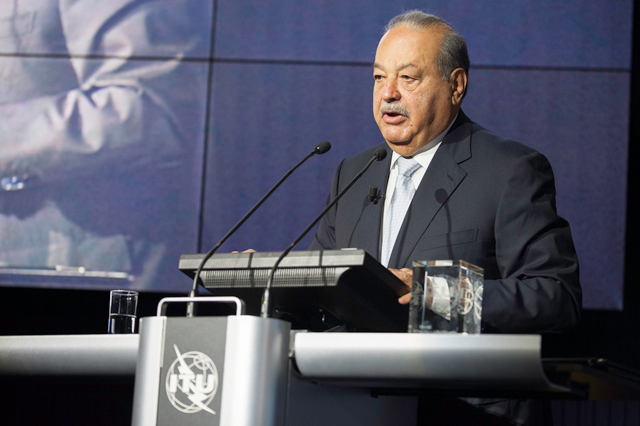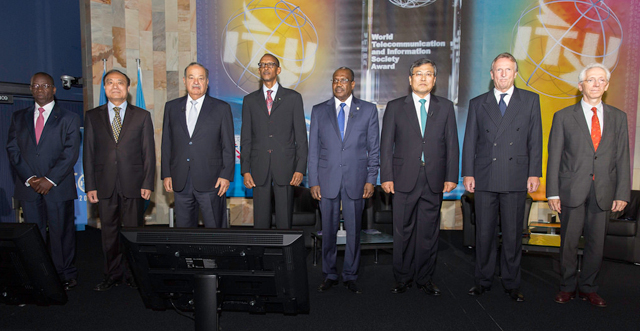
The International Telecommunications Union granted Mr. Carlos Slim the World Telecommunication and Information Society Award 2014, in recognition to his leadership and dedication in fostering ICT and broadband connectivity for sustainable development.
May 16, 2014. Geneva, Switzerland.
- Carlos Slim received World Telecommunication and Information Society Award 2014.
- Video. Biography Mr Carlos Slim Helú
- Video. Speech Mr Carlos Slim Helú
- Photos.
President of Rwanda Paul Kagame, President Park Geun-hye of Republic of Korea and entrepreneur Carlos Slim receive World Telecommunication and Information Society Award
ITU presented the World Telecommunication and Information Society Award to three eminent personalities: Mr Paul Kagame, President of the Republic of Rwanda; Ms Park Geun-hye, President of the Republic of Korea; and Mr Carlos Slim, Chairman, Grupo Carso and President of the Carlos Slim Foundation. The three laureates were honoured in recognition of their leadership and dedication towards promoting ICTs and broadband connectivity as a means of achieving sustainable development.
Welcoming the laureates to the World Telecommunication and Information Society Day ceremony, ITU Secretary-General Hamadoun I. Touré said, "Our distinguished laureates this year are among the greatest champions of ICT in the world. They have supported our work with tremendous zeal, and together we have accomplished a lot – particularly in highlighting the key role ICTs play in the global economy as well as in leveraging sustainable development."
World Telecommunication and Information Society Day 2014 marks the 149th anniversary of the establishment of ITU, which was founded in Paris on 17 May 1865. The theme for this year, 'Broadband for Sustainable Development' brings attention to the catalytic role of ICTs in securing smart solutions to achieve economic growth, social inclusion and environmental balance – the three pillars of sustainable development in the post-2015 era.
"ICTs are powerhouses of the global economy, offering solutions for sustainable economic growth and shared prosperity," said United Nations Secretary-General Ban Ki-moon in his message to mark World Telecommunication and Information Society Day. "Broadband networks provide smart eco-friendly solutions to manage booming cities and transport systems; enhance efficiency for manufacturing industries and power generation; conduct long-distance diagnosis and treatment for patients in remote locations; and promote innovative educational applications for students around the world."
"Broadband connectivity is a critical element today in ensuring that ICTs are used as effective delivery vehicles for health, education, governance, trade and commerce in order to achieve sustainable socio-economic growth," said ITU Secretary-General Hamadoun I. Touré. "We must commit ourselves in the service of humanity to make broadband the central element of the post-2015 sustainable development agenda."
Dr Touré added: "The right to communication is central to the information society; it is a key principle for equitable, affordable and universal access to information and knowledge that in turn empowers people to meet their aspirations and achieve their development goals."
The Award ceremony was followed by a high-level round-table discussion on how broadband connectivity and ICTs can be harnessed to meet the post-2015 sustainable development agenda.
ITU celebrates 150 years in 2015
The World Telecommunication and Information Society Day ceremony ended with a call to celebrate ITU's 150th anniversary in 2015.
"As ITU approaches its 150th anniversary next year, let us work together to bridge the digital divide and harness the power of technology to create a better and more sustainable future for all," United Nation Secretary-General Mr Ban Ki-moon said.



